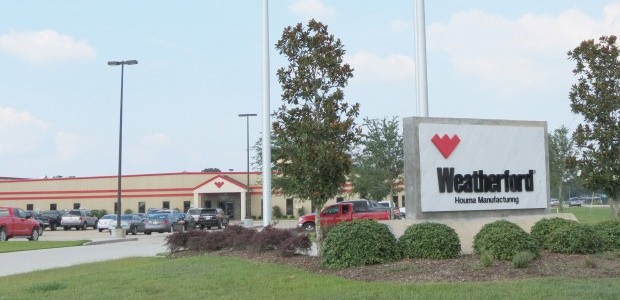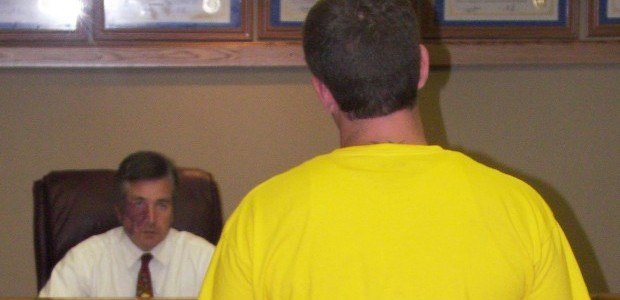
Weatherford leaving Terrebonne
July 3, 2012
RESTORE to bring billions to area
July 3, 2012Weddings in planes. Weddings in pools. Halloween-themed weddings.
It all sounds very Las Vegas until you check off performing weddings on swamp tours from Lafourche Parish Justice of the Peace Jean Rodrigue’s list, and you learn that all this is happening right in your own backyard … or the air above it.
“I once married a couple as we flew over Thibodaux in a chartered plane,” Rodrigue said. “It was just me, the couple, the two witnesses – you have to have two witnesses – and the pilot.”
Rodrigue has been a justice of the peace in Lafourche Parish for 32 years and represents three wards, 1, 5 and 6. Justices of the peace are elected to their post every six years, during even years, the same as district attorneys and district judges. In Terrebonne Parish, there are nine justices of the peace, four in Lafourche Parish and eight in St. Mary Parish.
As for the wedding in the pool, Rodrigue did not need his bathing suit – he stayed dry while the couple took the plunge, tuxes, white fluffy dress and all.
“When I did the Halloween one, the wedding party was dressed in a Dracula theme,” Rodrigue said. This justice of the peace estimates that he marries about 80 to 90 couples a year, but the majority of the nuptials are not the Julia Roberts-Lyle Lovett style elopements.
“They usually call from the clerk of courts office,” Rodrigue said. “Most people call and book me well in advance of the wedding. I don’t get too many spur of the moment weddings because most people plan the ceremony and get the license prior to the ceremony. If it is spur of the moment, I can waive the license requirement, but it must be filed within 72 hours of the wedding.”
In addition to presiding over weddings, justices of the peace also have a slew of other duties, most people are not even aware of, including evictions, title transfers on moveable property like vehicles, boats, boat trailers and mobile homes, garnishments, signing a warrant for misdemeanor criminal charges like battery and small claims courts listing damages of less than $5,000.
“I do garnishments, mostly when people default on loans from a finance company, but I don’t handle too many of those or evictions,” Rodrigue said. “There are not many finance companies and apartments in my wards.”
Rodrigue usually handles about three or four loan defaults a month and averages five evictions.
“I get lots of calls for advice about taking things to a higher court,” Rodrigue said. “I don’t have a designated office like most political officials. For justices of the peace, our offices are at our homes. We don’t have set schedules, we just make our appointments as calls come in.”
It is a busy job, and Rodrigue admits to becoming married to the job.
“If you don’t like people, don’t be a justice of the peace,” Rodrigue said, laughing. “I just like people. And I like my job – I’ve been doing it for 32 years.”
Another facet of small time, small town government many do not know exists is the mayor’s court, which is found in municipalities and incorporated settlements that fit into one of three classes – city, town or village. In the Tri-parish area, mayor’s courts exist in Baldwin and Jeanerette in St. Mary Parish as well as Lockport and Golden Meadow in Lafourche Parish. There are no mayor’s courts in Terrebonne Parish since it is a consolidated government.
In Lafourche Parish, attorney Mitch Theriot oversees mayor’s courts for Golden Meadow Mayor Joey Bouziga and Lockport Mayor Richard Champagne.
“I’ve been over the mayor’s courts in Lockport for 12 years and four in Golden Meadow,” Theriot, whose title is magistrate for the municipal courts in these two towns, said. “Big towns with city courts have more staff than municipalities do, and in municipalities, one staff member may have several duties instead of one specific duty like in a city court.”
Mayor’s courts, under municipal codes of ordinance, hear misdemeanors and traffic violations, and all felonies, like driving while intoxicated, are sent to district court. There is no jury in a mayor’s court, just the ruling of a single person, the magistrate.
“If someone is not satisfied with a mayor’s court ruling, they may petition the district court to hear the case,” Theriot said. “I enjoy hearing and interpreting cases. My least favorite part of job is seeing some of the same people, those who seem to be stuck in a vicious cycle of the criminal process. I wish we had more resources to break the chain, but sometimes some people are bad apples, and we can’t help them.”
Mayor’s courts meet once month. In Lockport it is the third Tuesday of the month and in Golden Meadow on the fourth Tuesday of the month. A typical docket, the number of individuals appearing for a summons, in Lockport ranges from 30 to 50 cases, and the court hears about three to five trials in a month. In Golden Meadow, the docket is larger, ranging from 80 to 100 cases with about 10 to 20 trials heard each month.
“Having these mayor’s courts is convenient for our citizens,” Theriot said. “It’s not as time consuming. The dockets are not as heavy, there is not a big backlog of cases and the sessions are shorter.”
Magistrate Mitch Theriot listen as a misdemeanor suspect pleads his case. In the Tri-parishes, justices of the peace and mayors are able to judge petty crimes and disputes, saving offenders the hardship of traveling to bigger courthouses and keeping court dockets free for more serious cases.










